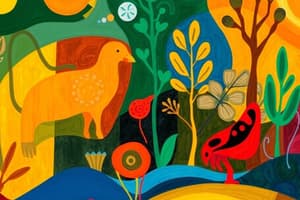Podcast
Questions and Answers
What is the term made up of 'bio' and 'diversity'?
What is the term made up of 'bio' and 'diversity'?
Biodiversity
Who coined the term biodiversity?
Who coined the term biodiversity?
Walter G Rosen
What percentage of the world's land area does India account for?
What percentage of the world's land area does India account for?
- 5%
- 10%
- 2.4% (correct)
- 1.5%
How many species of plants and animals are recorded in India?
How many species of plants and animals are recorded in India?
In which year was the Convention on Biological Diversity held?
In which year was the Convention on Biological Diversity held?
Which country is mega-biodiverse with 1/10th of the world's species?
Which country is mega-biodiverse with 1/10th of the world's species?
Which country has approximately 22,000 different vascular plants?
Which country has approximately 22,000 different vascular plants?
What percentage of India's species are found nowhere else in the world?
What percentage of India's species are found nowhere else in the world?
Indonesia has 1,531 species of birds.
Indonesia has 1,531 species of birds.
The term biodiversity is a compound of 'bio' and ________.
The term biodiversity is a compound of 'bio' and ________.
Flashcards are hidden until you start studying
Study Notes
What is Biodiversity
- Comprises 'bio' (life) and 'diversity' (variety), reflecting variability among living organisms.
- Defined as the variety of species from all ecosystems, including terrestrial and marine environments.
- Coined by Walter G. Rosen in 1985; a compound of 'Biological Diversity' introduced by Lovejoy in 1980.
- Highlighted in the Convention on Biological Diversity during the 1992 Rio Earth Summit.
India's Biodiversity
- Encompasses 2.4% of the world's land area yet houses 7-8% of all recorded species.
- Rich in biodiversity with over 45,000 plant species and 91,000 animal species.
- Ranks 10th globally in plant richness and 11th in endemic higher vertebrate species.
- Recognized as the 6th center of diversity and origin for agricultural crops.
Mega-Biodiverse Countries
- Brazil: Contains 1/10th of all species globally; 55,000 plants and 103,870 animals.
- Colombia: Hosts 45,000 plant species, making up 20% of global diversity; notable for its endemism.
- United States: Home to 428 mammal species and 784 bird species; rich in reptile and amphibian diversity.
- South Africa: 22,000 vascular plant species which constitute about 9% of known global species.
- Philippines: Notable for its endemism with 100 mammal and 170 bird species.
- Papua New Guinea: Holds 5% of global biodiversity on less than 1% of Earth's land.
- Malaysia: Contains diverse species including 210 mammals and extensive insect varieties.
- Democratic Republic of Congo: Represents around 20% of global animal species.
- Australia: Wide variety of reptiles (755 species), with dominant eucalyptus flora; iconic species include kangaroo and koala.
- Mexico: 12% of the world’s biodiversity, featuring 200,000 species overall.
- Ecuador: Rich in birds (1,600 species) and butterflies (6,000 species).
- Peru: Hosts 21,000 plant and bird species, with around 6,000 being endemic.
- Madagascar: Unique with 14,000 plant species where 90% of flora and fauna are endemic.
Biodiversity Conservation
- Recognized by Conservation International (CI) to promote awareness of biodiversity conservation globally.
Studying That Suits You
Use AI to generate personalized quizzes and flashcards to suit your learning preferences.




